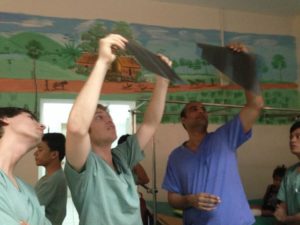Dr Saqib Noor is the author of Surgery on the Shoulders of Giants: Letters From a Doctor Abroad. He has also discussed global surgery on the BBC Asian Network, local BBC Radio, and on Talk Radio Europe.

At a recent conference on global surgery at the Royal College of Surgeons in London, a familiar discussion began about the role of trainees in global healthcare projects. The imposing lecture theatre in the historical college building was equally filled with bright eyed surgical trainees, hopeful medical students and senior consultant surgical and anaesthetic colleagues.
It had been suggested from the podium that there was no role for the trainee in the austere environment – that to provide the ethical care that patients deserve, only fully-qualified consultant teams should be involved in clinical practice abroad. Naturally, this position was challenged and Pandora’s box was soon opened, with all the pitfalls of volunteerism flying out one by one in a heated flurry.
There is no doubt that the moral and ethical challenges facing any clinician in an unfamiliar environment are enormous. From maintaining our own personal safety to the safety of our patients, anyone embarking on such a global venture must overcome a number of obstacles. We are all familiar with either the true stories or fables of the do-gooder who tramples over cultural sensitivities, or performs arguably negligent medicine, or absorbs scarce resources, or disturbs delicate balances of team comradery. Worse still, there are stories of volunteers putting themselves and others at unnecessary risk.
The challenge for the trainee is further increased as they have not yet achieved the standards to practice medicine and surgery independently – and therefore still require some form of senior supervision. However, working outside of a competency range must ethically apply to all clinicians, whether certified as an independent practitioner or not, because undoubtedly the pathology of cases being treated in the austere environment, and with less resources available, even an experienced consultant could easily find themselves out of their depth.
However, despite these well documented challenges, the contribution made to global health programmes by trainees and the symbiotic learning that takes place between healthcare staff across the globe vastly outweighs the risks.[1] Within the right framework and suitable supported environments, trainees can engage, contribute and gain from either short trips or prolonged periods dedicated to their training needs and personal growth, as well as inspire a generation for further work in the field.
With the Lancet Commission on Global Surgery, and the goals to improve access to safer surgery worldwide by 2030, there is a surge in interest for global health and surgical programmes amongst trainees.[2] Medical student organisations like Incision and Medsin are further promoting the ability for students and trainees to make meaningful contributions towards the cause.
The debate should no longer be related to whether trainees and students should be involved, but how best to ensure all clinicians for global projects are prepared and supported.
Although we all abide by the founding ethical principles of our profession, the scenarios we face abroad can often blur these lines. A number of publications and increasing intensity of courses have been developed, either online or in real time, dedicated to teaching healthcare staff the ethics and principles of practice in low income countries.
As the world is getting smaller, and travel and communication easier between fields of medicine, with more projects being established, we must now find permanent solutions to training staff who wish to work in low income countries. A mandatory certification, or a robust preparatory programme along with controlled support in the low income country would provide a solid foundation for any trainee working in the global setting. Indeed, organisations like the United Nations have mandatory programmes and more locally, the Royal College of Anaesthetists have an obligatory course for any of their trainees taking out of programme training in a low or middle income country.
These solutions to ethical dilemmas can either be incorporated into medical school syllabuses prior to the traditional foreign medical student elective or as special study modules within the Royal College curriculums. Alternatively, courses or teaching sessions should become mandatory for any registered healthcare staff member wishing to travel on networked programmes. Having certification or qualifications for work in low income countries should become the first stepping stone to a positive and productive experience abroad.
It is time to secure an achievable, affordable and ethical solution to the ethical and moral challenges we all face abroad, so that we can all contribute and personally gain to the best of our ability, from student to senior consultant.

References
[1] ‘Ethics of surgical training in developing countries’. Ramsey K, Weijer C. World Journal of Surgery, 2007 Nov: 31(11): 2067-9.
[2] ‘Global Surgery 2030: evidence and solutions for achieving health, welfare, and economic development’. Meara G et al. The Lancet, 2015.